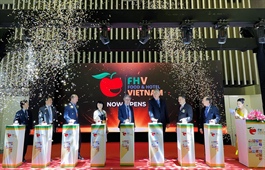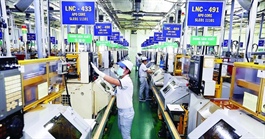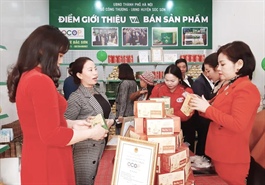Developing plantation areas, origin traceability critical to increase export to China as standards set
Developing plantation areas, origin traceability critical to increase export to China as standards set
Developing plantation areas and ensuring origin traceability were important factors for Viet Nam to increase the export of farm produce to China which had tightened hygiene and safety standards for imported food.

China was no longer an easy market. There were dramatic changes since the General Administration of Customs of China issued Decree 248 on regulations for the registration and administration of overseas producers of imported food and Decree 249 on administrative measures on import and export food safety in April 2021 which took effect from the beginning of 2022.
After a year, there were a number of problems that needed to be tackled in order to expand exports to China, a conference on granting plantation area codes and origin traceability heard on Wednesday.
The Ministry of Agriculture and Rural Development said that the ministry and the General Department of Customs of China signed five protocols on plant quarantine for agricultural products, including durian, banana, passion fruit, sweet potato and edible bird’s nest. This opened a large opportunity for Viet Nam’s agricultural products to expand in the world’s most populous market.
There were challenges, however, as China tightened requirements on food quality and safety, the ministry said.
Ngo Xuan Nam, deputy director of the Vietnam Sanitary and Phytosanitary Notification Authority and Enquiry Point (SPS Vietnam), said since the two decrees came into force, China granted 2,426 codes for Vietnamese products for export into this market, which is quite modest compared to other countries in the region.
Nam pointed out that many enterprises had not yet fully understood the food safety standards of China and the steps for registration and declaration. Currently, China changed 10,092 standards for residue levels of 564 kinds of food and issued 36 national food safety standards since July.
“It is a must to understand these regulations and fulfil the application to expand exports to China,” Nam said, urging enterprises to set up a food hygiene and safety management system following the hazard analysis and critical control points (HACCP) principles.
Hoang Khanh Duy, deputy head of the Management Board of Dong Dang Border Gate Economic Zone, Lang Son Province, said many enterprises had not carefully studied decrees 248 and 249, thus, they were confused when implementing the registration, leading to delays in customs clearance.
Duy said that there was also fraud in declaring codes of plantation areas and packing facilities which would negatively affect exports to China.
Developing plantation areas
A representative from Nafoods Group which was going to officially shift the first container of passion fruit to China said that scattered production was the major difficulty to the management and granting of codes for plantation areas.
For example, there was a total of 2,000ha of passion fruit in Viet Nam which was scattered in many localities, making it difficult for code granting and management.
Nafoods said that it was necessary to develop planning for plantation areas of products to increase exports to China. In addition, support should be provided for farmers to ensure the plantation follows standards.
According to Deputy Director of Can Tho City Department of Agriculture and Rural Development Nguyen Tan Nhon, inspection must be enhanced to ensure transparency in production and prevent fraud in the use of plantation area codes.
In addition, enterprises must cooperate with each other to establish supply chains that ensure export quality.
























